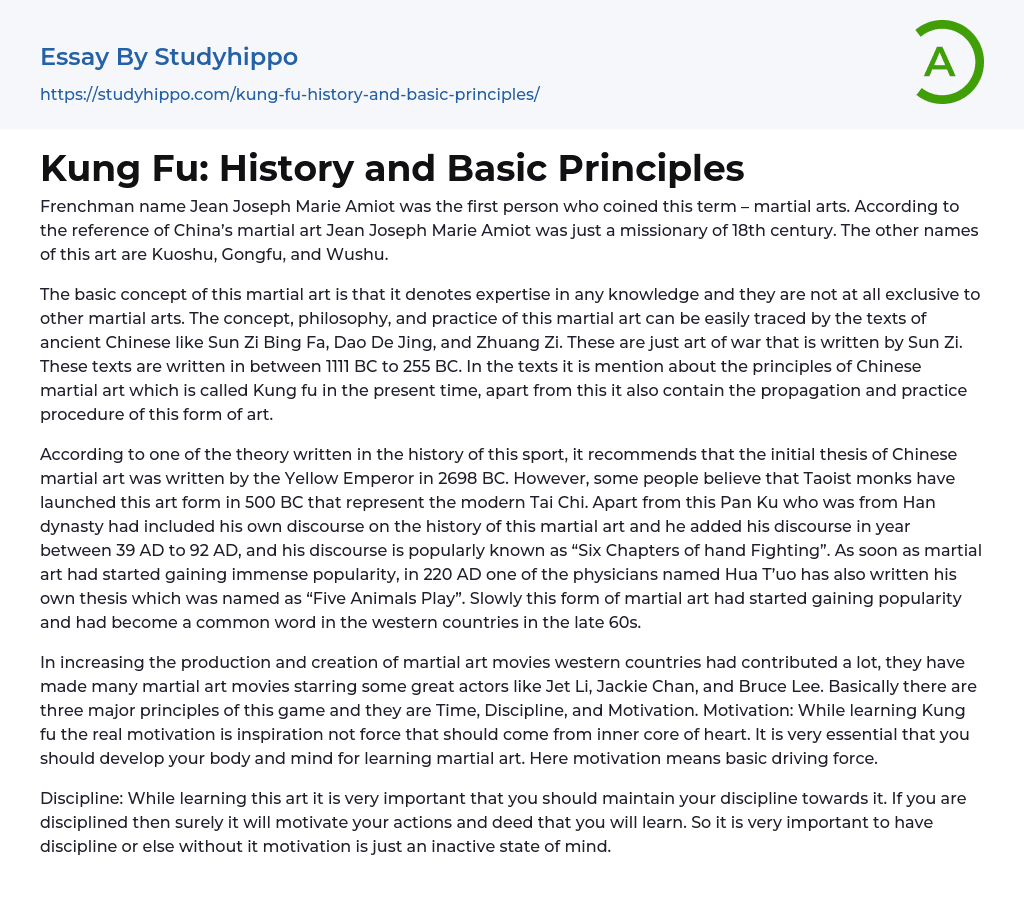In the 18th century, the term "martial arts" was introduced by Jean Joseph Marie Amiot, a French missionary. He used it to refer to China's Kuoshu, Gongfu and Wushu practices.
The fundamental principle of this martial art entails proficiency in various areas of expertise, and it does not exclude other forms of martial arts. The philosophy, concept, and practical application of this martial art can be easily traced through ancient Chinese texts such as Sun Zi Bing Fa, Dao De Jing, and Zhuang Zi. These texts, authored by Sun Zi between 1111 BC to 255 BC, outline the principles of Chinese martial art, commonly known as Kung Fu in present times. Additionally, they provide guidance on the propagation and methods of practicing this form of art.
One theory in the history of Chinese martial arts suggests that the ini
...tial thesis was written by the Yellow Emperor in 2698 BC. Another theory is that the modern Tai Chi form originated from Taoist monks around 500 BC. During the Han dynasty, Pan Ku wrote about hand fighting and his work became famous as "Six Chapters of Hand Fighting" between 39 AD and 92 AD. In addition, a physician named Hua T’uo authored a thesis called “Five Animals Play” in 220 AD. Over time, this form of martial arts gained popularity and became well-known in western countries during the late 60s.
Martial art movies, featuring famous actors like Jet Li, Jackie Chan, and Bruce Lee, have been significantly produced and created by Western countries. The discipline of Kung Fu is based on three vital principles namely Time, Discipline and Motivation. In order to learn Kung Fu effectively, motivation plays a crucia
role which should be derived from personal inspiration rather than external pressure. It is essential to develop both the body and mind for mastering martial arts where motivation acts as the fundamental driving force behind one's efforts.
It is crucial to maintain discipline when learning this art. Discipline will serve as a motivator for your actions and deeds. Without discipline, motivation remains an inactive state of mind.
- Russian Empire essays
- Ancient Greece essays
- British Empire essays
- Historical Figures essays
- Nazi Germany essays
- Roman Empire essays
- War essays
- Revolution essays
- 19Th Century essays
- Historiography essays
- History of the United States essays
- 20Th Century essays
- World History essays
- Vikings essays
- Declaration of Independence essays
- Civilization essays
- Evidence essays
- Genocide essays
- Colonialism essays
- Rebellion essays
- 1960S essays
- 1920S essays
- 1950S essays
- Letter from Birmingham Jail essays
- Louisiana Purchase essays
- The Columbian Exchange essays
- World Hunger essays
- What is History essays
- Bravery essays
- Gilded Age essays
- Vladimir Lenin essays
- Alexander The Great essays
- Sparta essays
- Victorian Era essays
- Henry v essays
- Stonehenge essays
- Frederick Douglass essays
- Mahatma Gandhi essays
- Joseph Stalin essays
- Geert Hofstede essays
- George Eliot essays
- Ginevra King essays
- John Keats essays
- Siegfried Sassoon essays
- Ben jonson essays
- Billy elliot essays
- Wilkie collins essays
- John Proctor essays
- Harriet Tubman essays
- Napoleon essays




